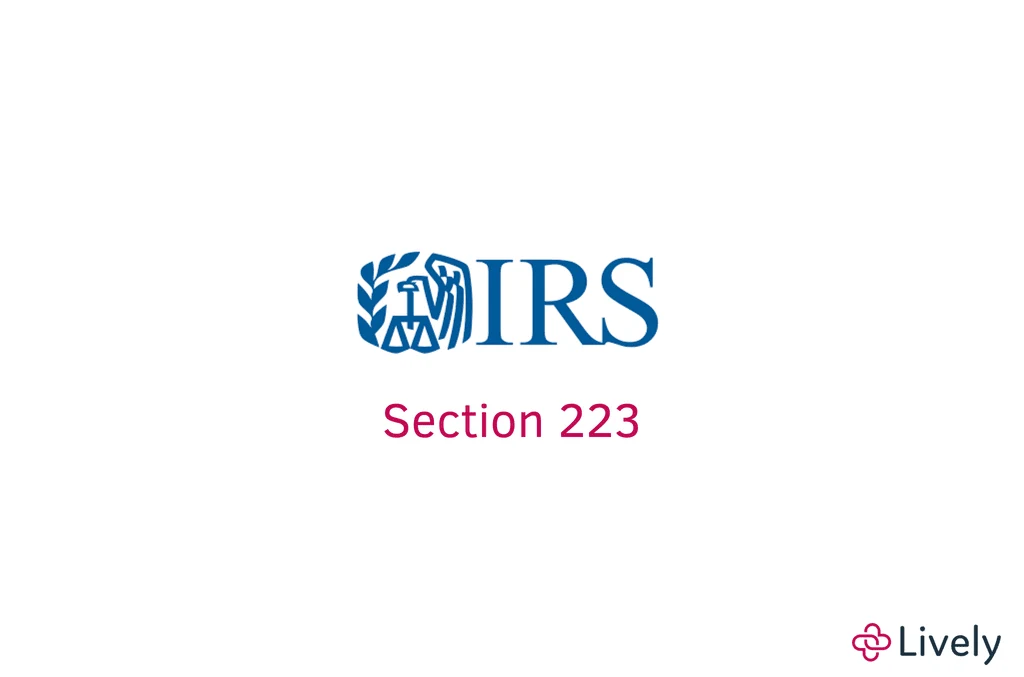The Lively Blog
SIGN UP FOR OUR
Newsletter
Stay up to date on the latest news delivered straight to your inbox
IRS Section 223
Lively · May 16, 2018 · 3 min read

Understanding IRS section 223 as it relates to health insurance and HSA-eligibility is the baseline requirement needed to outline and establish all HSA savings benefits. Refer to this HSA IRS eligibility guide to understand how and if you can add an HSA to your health insurance plan.
What is IRS Section 223?
IRS section 223, with respect to preventive health services required under Public Health Service Act, allows individuals and families, who have a qualifying health insurance plan to open a health savings account (HSA).
What an HSA?
An HSA or Health Savings Account is a personal savings account for health expenses. In more technical terms, an HSA is an interest-bearing custodial account that can be used for health-related expenses with contributions limits set annually by the IRS.
How Does an HSA Work?
HSAs are owned by individuals (not employers) and can be transferred from job to job or institution to institution, similar to a 401k or IRA. Contributions are 100% tax deductible (until you reach the federal limit).
An HSA is not a healthcare plan, but can be used in conjunction with all high-deductible healthcare plans (HDHP) in the US. Further, your HSA will move with you from insurance carrier to insurance carrier.
2019 HSA Contributions Limits
2019 HSA contribution limits are $3,500 for individuals and $7,000 for families.
2019 HSA Eligibility Health Plan Requirements
Your health insurance plan must have an annual minimum deductible of $1,350 for individuals and $2,700 for families.
Annual out-of-pocket maximum for 2019 can’t be more than $6,750 for individuals and $13,300 for families (only applies to the in-network services).
The health insurance plan must be so that the individual/family pays the first cost of healthcare up to the deductible before any kind of insurance kicks in (preventative care excluded from this definition). This includes prescription drugs as well. The deductible and maximum out-of-pocket expenses are indexed annually for inflation.
Family coverage is determined by having an insurance policy that covers you and at least one other person.
Other HSA Eligibility Requirements
You can’t have or be eligible to use a general purpose Flexible Spending Account (FSA). Limited purpose FSAs are allowed for dental, vision, and dependent care if your HDHP doesn’t cover those services (be sure to check with your employer).
You can’t be claimed as a dependent on someone else’s tax return.
You can’t be enrolled in Medicare (Part A and Part B) or Medicaid.
You can’t be covered on someone else’s non-HSA eligible HDHP.
What Are the Benefits of an HSA?
Triple Tax Advantages – HSAs allow for tax-deductible contributions, tax-free interest and tax-free withdrawals (for medical expenses). You can save, spend or invest your HSA 100% tax-free.
Health Care Costs In Retirement – Healthcare costs in retirement are expected to exceed $275,000 for couples. An HSA provides the only path to save dedicated funds for these costs. The triple-tax advantages noted above allow this money to grow tax-free.
Retirement Savings – Just in case you don’t spend your HSA funds on health-related costs, after the age of 65, you can use those funds for anything just like a 401(k) or IRA. Unlike a 401k, an HSA has no mandatory distributions in retirement. You get to decide when and if to sell those pre-tax assets and investments in your HSA.
While an HSA has distinct IRS requirements, which can be tough to navigate, HSA benefits create some of the most opportunistic savings in healthcare (and maybe even retirement)! Use an HSA to your advantage, and make sure to check back here, for any updated IRS HSA requirement adjustments.

Benefits
2025 and 2026 Maximum HSA Contribution Limits
Lively · June 20, 2025 · 3 min read
On May 1, 2025, the IRS announced the HSA contribution limits for 2026: $4,400 for individual coverage and $8,750 for family coverage. That’s a $100–$200 increase from the 2025 limits, which are $4,300 and $8,550 respectively. If you’re 55 or older, you can still contribute an extra $1,000.

Benefits
What is the Difference Between a Flexible Spending Account and a Health Savings Account?
Lauren Hargrave · February 9, 2024 · 12 min read
A Health Savings Account (HSA) and Healthcare Flexible Spending Account (FSA) provide up to 30% savings on out-of-pocket healthcare expenses. That’s good news. Except you can’t contribute to an HSA and Healthcare FSA at the same time. So what if your employer offers both benefits? How do you choose which account type is best for you? Let’s explore the advantages of each to help you decide which wins in HSA vs FSA.

Health Savings Accounts
Ways Health Savings Account Matching Benefits Employers
Lauren Hargrave · October 13, 2023 · 7 min read
Employers need employees to adopt and engage with their benefits and one way to encourage employees to adopt and contribute to (i.e. engage with) an HSA, is for employers to match employees’ contributions.
SIGN UP FOR OUR
Newsletter
Stay up to date on the latest news delivered straight to your inbox
